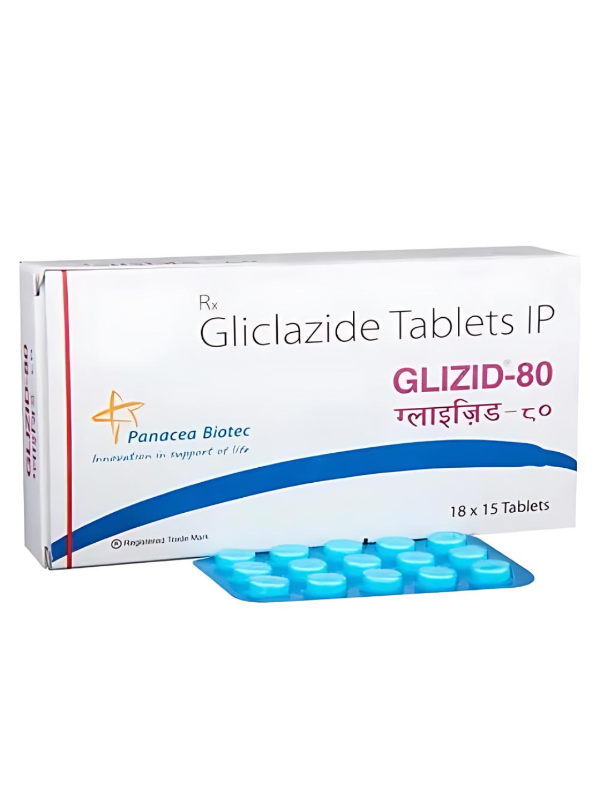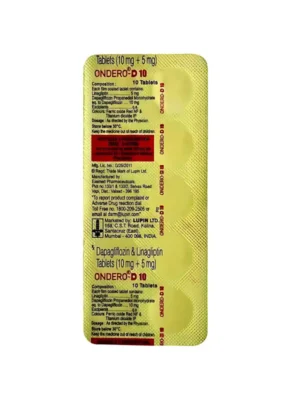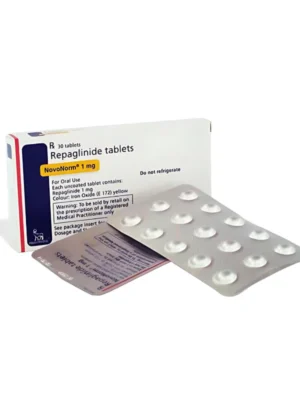Description
Glizid Tablet (Gliclazide) – Treatment for Type 2 Diabetes Mellitus
Glizid Tablet is an anti-diabetic medication belonging to the sulfonylurea class, used to treat Type 2 Diabetes Mellitus in adults. It effectively controls blood sugar levels by stimulating insulin production from the pancreas, helping prevent serious complications like kidney damage, blindness, and nerve disorders. Take this medicine with food at the same time daily for optimal results. Your doctor may adjust the dose based on your blood sugar response. Remember that it works best when combined with healthy eating, regular exercise, and weight management as part of a comprehensive diabetes care plan. Never stop treatment without medical supervision, as this may cause dangerous spikes in blood sugar levels.
Uses of Glizid Tablet:
Benefits of Glizid Tablet:
- Stimulates insulin secretion for better blood sugar control
- Helps prevent diabetes complications
- May improve blood vessel health
- Enhances body’s insulin utilization
Side Effects of Glizid Tablet:
Most side effects are temporary, but consult your doctor if persistent:
- Hypoglycemia (low blood sugar)
- Weight gain
- Flatulence
- Diarrhea
- Headache
- Nausea
- Dizziness
How to Use Glizid Tablet?
Take with food to reduce stomach upset. Swallow whole – do not chew, crush or break. Maintain a consistent daily schedule as prescribed.
How Glizid Tablet Works?
The Tablet contains Gliclazide which:
- Stimulates pancreatic beta cells to produce more insulin
- Helps move glucose from blood into cells for energy
- Improves insulin sensitivity in peripheral tissues
- May provide vascular protection benefits
Safety Advice:
- Alcohol: UNSAFE – increases hypoglycemia risk
- Pregnancy: CONSULT DOCTOR – potential fetal risk
- Breastfeeding: UNSAFE – may cause infant toxicity
- Driving: CAUTION – hypoglycemia may impair alertness
- Kidney Disease: CAUTION – dose adjustment may be needed
- Liver Disease: CAUTION – dose adjustment may be needed
What If You Missed a Dose?
Take as soon as remembered. If near next dose time, skip the missed dose. Never take double doses.
Drug Interactions:
Use with caution when taking:
- Disopyramide (Severe hypoglycemia risk)
- Amisulpride (May reduce effectiveness)
- Allopurinol (May cause hypoglycemia)
- Amiodarone (May increase drug levels)
FAQs:
Q1. What is the best time to take Glizid Tablet?
Take with breakfast or as directed by your doctor. Morning administration with food helps maintain stable blood sugar levels throughout the day.
Q2. Is Glizid the same as metformin?
No. While both treat Type 2 Diabetes, It stimulates insulin production, whereas metformin improves insulin sensitivity and reduces liver glucose production.
Q3. Can I take metformin with Glizid?
Yes, if prescribed. Doctors may combine them for better sugar control, but this increases hypoglycemia risk. Follow your doctor’s instructions carefully regarding meal timing and dosage.
Q4. Is Glizid Tablet harmful to kidneys?
Generally safe for normal kidneys, but requires dose adjustment in kidney disease. Inform your doctor about any kidney problems as the drug is excreted renally.
Q5. How to manage hypoglycemia with Glizid?
Recognize symptoms (sweating, dizziness) and always carry fast-acting glucose (juice, candy). Maintain regular meal schedules and avoid alcohol.
Q6. Can Glizid Tablet cause weight gain?
Yes, some patients may experience weight gain due to increased insulin activity promoting fat storage.
Q7. Who should avoid Glizid Tablet?
Patients with Type 1 Diabetes, diabetic ketoacidosis, severe liver/kidney disease, or allergies to sulfonylureas.








There are no reviews yet.